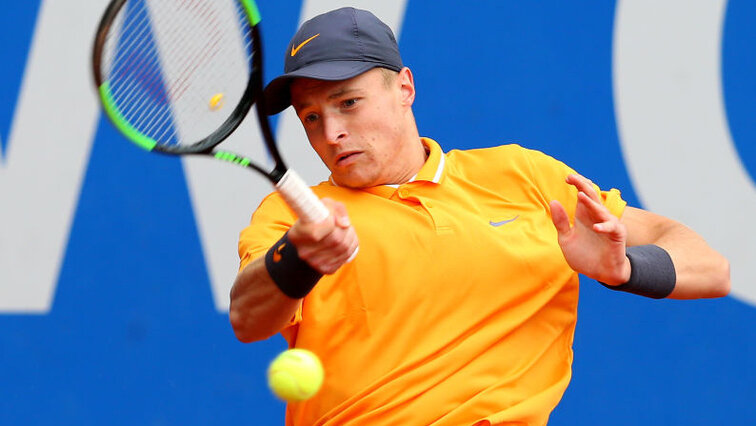German youth worries: envious look at Italy
What's next for women after Angelique Kerber ? What about the men apart from Alexander Zverev ? The prospects for German tennis have been better.
by Jörg Allmeroth
last edit: Jan 24, 2022, 03:16 pm

It doesn't always have to be the big names that write big stories in sport. Stories to remember. Alize Cornet, the 32-year-old French, created such a memorable story beyond tennis superstars at the Australian Open on Monday. She had competed in every Grand Slam tournament since 2007, and number 61 in the world rankings had only failed to do one thing by January 24, 2022 - to move into the round of the last eight, in fairly exclusive territory. And then this: A heat battle in Melbourne, 33 degrees in the shade, a challenging duel against former world number one Simona Halep, a fight almost to the point of dropping. Then the 6: 4, 3: 6, 6: 4 victory, the memorable picture of her kneeling on Center Court, many tears of happiness after the long-awaited quarter-final breakthrough in the 63rd attempt, believe it or not. A victory of tenacity, perseverance, never-ending willpower. A victory that Cornet later said about: “It pays to never give up. And to always believe in yourself, even when no one else does.”
Perhaps Barbara Rittner, the German head of women's tennis, will soon show her youngsters the example of Cornets - when it comes to careers in tennis, staying involved in this moving and moving sport, motivation, diligence and perseverance. Rittner and the other people in charge of the largest tennis association in the world didn't have much to laugh about at the current Australian Open, first the three-time Grand Slam winner Angelique Kerber failed in the opening round, then after almost a week Alexander Zverev lost his dreamed of title mission - in the round of 16 after a catastrophic performance against the Canadian Denis Shapovalov .
State of emergency in global talent competition
But the difficulties of the two front figures and zero surprises from the rest of the contingent were only one problem - because this opening Grand Slam in the 2022 game year also highlighted the aging of Germany at the top. In other words: Where in Melbourne - and not only there - young talents like Clara Tauson, Amanda Anisimova, Iga Swiatek , Jannik Sinner , Carlos Alcaraz , Felix Auger-Aliassime or Sebastian Korda cause a sensation, in Germany there is more of an emergency in the global talent competition. Neither men nor women are professionals in the age group in their early twenties currently arguing with the best at the top level, in the Rittner district hopes still weigh on the last representatives of the golden generation: Kerber and her friend Andrea Petkovic, who is currently the only DTB Salute representatives among the top 100. For the men, Zverev has just become a lone fighter again, who has to shoulder all the expectation ballast. A player who, alongside Zverev, could register serious ambitions for a place among the top players in the world is far and wide not in sight.
After all, DTB boss Michael Kohlmann can still show five players who appear behind Zverev in positions between 50th and 100th place in the world rankings – however, only one of them is under 25 years of age, Daniel Altmaier (23) from Kempen, who is in the first Melbourne round lost to Zverev. The many career detours among the men are striking, often beyond the DTB institutions. The currently third-best German, Dominik Koepfer from Furtwangen, made the leap into top tennis, as did Alex Waske and Benjamin Becker before him via American college tennis. It is also remarkable how often highly traded juniors get lost early in the career jungle - the quickly hyped Brandenburger Rudi Molleker, for example, recorded more coach changes than cup wins in his young, already extremely complicated tennis biography.
Italy has Sinner, Berrettini, Musetti
Many German officials and fans look enviously at the new model country Italy, which can show a whole group of young top players - above all the two top ten players Matteo Berrettini and Jannik Sinner, but also another promising man like 19-year-old Lorenzo Musetti . Italy has gradually worked its way up to the big nations in recent years, with an effective funding system and a "great tournament landscape just below the big tour," says expert Boris Becker. However, he also says: "Many younger people in this country forget that Federer, Nadal and Djokovic were above all training world champions."
The youngest Wimbledon winner of all time and former men's boss at the DTB meets an issue that ex-colleague Rittner knows only too well - a lack of hardness among the youngsters, a mentality problem. Rittner has already seen many promising players from earlier years come and go quickly, top juniors like Marlene Weingärtner, Annika Beck or Antonia Lottner just as little as the very talented Carina Witthöft from Hamburg made the leap into the world class. Rittner judges that improvement is not in sight quickly, with teenagers the bite, the passion and the will to assert themselves are currently less pronounced than in previous generations: "Many are not ready to leave their comfort zone." All the more regrettable at a moment when the German Tournament scene was revived with the competitions in Berlin, Bad Homburg and Cologne.

